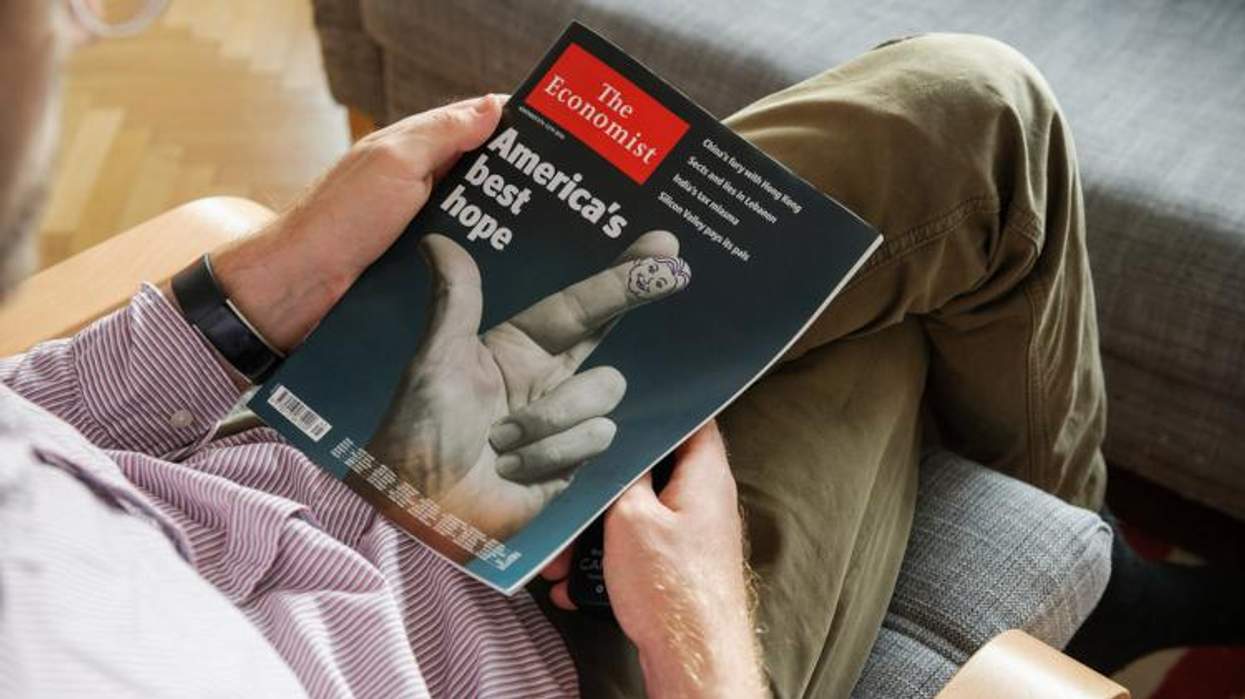The Economist, a respected British news magazine not known for having a political slant, has published a column opposing transgender women's participation in women's sports at the Olympics and referring to them as "biological males."
The column, published online Tuesday, is part of The Economist's By-Invitation section, which "publishes commentaries from a range of perspectives," the magazine states on its website. In addition to the anti-trans column, there is one supporting trans women's right to compete alongside cisgender women. Registration is required to read the full articles, but it's free.
The anti-trans piece was written by Chelsea Mitchell, who was among the student athletes who sued the Connecticut Interscholastic Athletic Conference over its trans-inclusive policy for school sports. A trial court dismissed the suit, but the decision is being appealed.
"The Olympics have finally begun, but under a shadow -- one that has increasingly haunted women's sports," Mitchell wrote. "This year, for the first time, biological males who identify as women will openly compete in the female category, owing to an International Olympic Committee (IOC) policy that permits them to do so. It establishes unfairness at the very heart of the most important athletic competition in the world."
Mitchell, a runner, said that in high school competitions, she lost "repeatedly" to two trans girls, or, as she calls them, "biological males." (Notably, the Connecticut trans girls are often cited by politicians supporting trans-exclusionary laws -- and the politicians can't come up with any other examples of trans dominance in sports.) She went on to list the supposed advantages that trans female athletes have over cisgender ones, and says they are pushing cis women and girls out of sports.
Laurel Hubbard, the New Zealand weight lifter who will be the first out trans woman to participate in the Olympics, in a competition set for Monday, is "a 43-year-old biological male with massive, inherent physical advantages [who] took the spot of a female athlete at the Olympics," Mitchell wrote. "That is not a story of fairness and justice. It is a story of injustice being perpetuated in an ill-considered bid for political correctness."
Veronica Ivy, a cycling champion who is a trans woman, provided the opposing viewpoint. "Estimates are that approximately 0.6% of the American adult population is transgender," she wrote. "Taking that figure as a possible global rate, at 54,000 Olympians, statistically you'd expect around 300 trans athletes. And yet until this year, there has been none. There has not been an openly trans world champion in an Olympic sport, nor at major golf or tennis championships, nor holding elite world records. Nothing. If there were any advantages for trans women athletes, surely we'd have seen it by now."
"Fairness requires inclusion," she continued. "Let's stop policing womanhood, in all its diversity. Let's celebrate the fact that trans women are women in the ways that matter. We should applaud the barriers being broken by the first openly transgender athletes to attend the Olympics this year. Breaking barriers is what the Olympics is all about."
The Economist ran a story two weeks ago purporting to explain why trans women's presence at the Olympics is controversial. It contended that the International Olympic Committee's policy of allowing trans women to compete alongside cis women only if they've been on testosterone-suppressing medication for at least a year is insufficient to ensure an equal playing field.
"Many of the advantages conferred by male puberty are permanent. ... And no amount of hormone therapy can reduce the size of an athlete's body," the story said.
Mary Emily O'Hara, rapid response manager at GLAAD, the LGBTQ+ media watchdog group, shared Mitchell's article on Twitter and pointed out the misgendering of Hubbard. But many of those who commented on her tweet called the article's reporting accurate.
On The Economist's Twitter feed, most of the comments on both Mitchell's and Ivy's articles were anti-trans. But one commenter wrote, "Did you read the article? Trans people make up 0.6% of the population. Which means, statistically, there should be around 30 trans women competing at the olympics. That number would be higher if trans women were dominant in female sports. There are less than ten."
A GLAAD spokesperson provided this statement to The Advocate: "Transgender people belong in sports, as the Olympics and Paralympics have recognized in their policies to include them for the past 17 years. Terms such as 'biologically male' are inaccurate and often used as slurs by anti-LGBTQ activists like those inexplicably platformed by The Economist. Another outlet [USA Today] recently removed the term from a similarly fronted op-ed because it is inaccurate and used to target trans people and children. Transgender people's right to exist and participate in sports and society should not be framed as a 'side' in a debate. Media outlets should insist that the facts guide both news coverage and opinion coverage, especially when the opinions are based on false claims that cause real harm."
GLAAD, Athlete Ally, and Pride House Tokyo have released a guide for journalists covering LGBTQ+ athletes at the Olympics and Paralympics.




































































Charlie Kirk DID say stoning gay people was the 'perfect law' — and these other heinous quotes